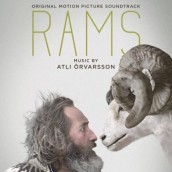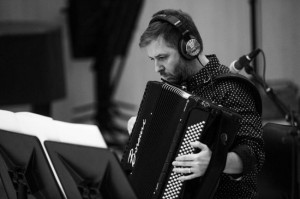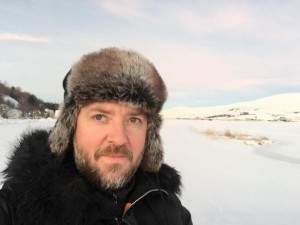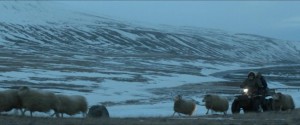There’s a muscular, solitary spirit that hails from The Great White Nord, as well as a natural eccentricity. Perhaps that might explain the individualistic, off-kilter spirit running through even the most bombastic multiplex movies that Icelander Atli Örvarsson has scored in Hollywood. Drawn to Hans Zimmer’s orbit like so many talented western European composers (if geographically located on a mostly frozen volcanic land mass), Örvarsson rose through such American TV shows as DRAGNET and LAW AND ORDER: CRIMINAL INTENT to impress with his surreal film scores for BABYLON A.D. and THE FOURTH KIND. With Viking blood no doubt in his family tree, Örvarsson also showed a talent for sword-swinging history in SEASON OF THE WITCH and THE EAGLE, as well as the gonzo, gargantuan fantasies of HANSEL & GRETEL: WITCH HUNTERS and THE MORTAL INSTRUMENTS: CITY OF BONES.
Örvarsson is a composer rarely given the chance to go musically small when characters are speaking English (excepting the powerful A SINGLE SHOT). But given the opportunity to not only score, but associate produce a critically acclaimed homegrown dramedy, Örvarsson delivers his very effective version of an unplugged soundtrack with RAMS, a proudly offbeat affirmation of his musical identity that shows just as much emotional power in its rustic, instrumental simplicity.
Directed by Grímur Hákonarson (SUMMERLAND), RAMS tells the often humorous parable of the two aged Bolstadar brothers, going about their business of shepherding with no words spoken between them in fifty years – despite the fact that they live right next door to each other in the middle of nowhere. The loves of their lives are their male sheep (though not in that way) that they preen for championship titles with all the order of mothers prepping beauty contestants. When their woolen-fleeced families are suddenly attacked by the dreaded, infectious disease of scrapie, the authorities force them to annihilate their herds. The slightly more gregarious Gummi (Sigurður Sigurjónsson) can’t bring himself to wipe out his loved ones, enraging his jealous, alcoholic sibling Kiddi (Theodór Júlíusson) all the more.
What follows is battle of wills, as towering as that of any bitter, rival ranchers in a Hollywood western – though as translated to two old coots in a landscape that would make mincemeat of John Wayne. Communicating a prairie sound that an uninformed listener might indeed mistake for movie about terribly lone cowboys riding a forbidding range, Örvarsson’s beautifully spare, yet striking themes for strings, accordion, organ and piano hears “Rams’” visual sparseness with haunting lyricism for a dying way of life. It’s a powerful, melodic simplicity that also speaks for these brothers’ stubborn family history on a tundra where the human-animal bond goes 1,000 years back, emotion that’s especially important when the subtitled dialogue is at a premium. The score’s bleakness also serves as a deadpan contrast to RAMS’ sly, quirky humor that makes the movie surprisingly engaging. In short, you’d have no idea that the man behind VANTAGE POINT or THE PERFECT GUY had anything to do with this score, which says much about how effectively Atli Örvarsson has reclaimed his musical Icelandic identity with these critically acclaimed, oddball herders.
ASSIGNMENT X: What makes an Icelander? Do you think there’s a national character, or approach to life as such that separates it from other Nordic countries?
ATLI ÖRVARSSON: I do think there’s definitely an Icelandic national character, as there is for most, or perhaps all nations. I used play this game in airports where, if I saw someone who I for some reason thought was Icelandic, I’d try to listen in and see if I was right. Usually I was! It’s actually a fascinating subject – what makes a nation and their characteristics? So much of it is in the unspoken, body language, etc. The Icelanders are fiercely independent, slightly arrogant, not too terribly disciplined yet very lovely and fun to be around. The Viking blood is very much alive and well too, so the explorer gene makes us want to go abroad and travel. That might explain why a nation of roughly 300.000 people has two international airlines!
AX: How did music first touch you in Iceland, let alone the idea of having a career as a Hollywood film composer?
ÖRVARSSON: I got it from both of my parents and my extended family so I’ve been immersed in it all along. Icelanders have, or at least used to have, this urge to sing when they get together, especially if they’ve had a little bit to drink! I grew up taking music lessons, playing in all kinds of ensembles from rock’n’roll to jazz to classical so I had a very broad musical upbringing. My first professional gig was actually as a trumpet player in a pit orchestra for a production of “My Fair Lady” when I was 13. I’ve often wondered if that was the seed that spawned my love for the intersection of music and drama. But it was really at Berklee College of Music that I got exposed to writing for the screen. I immediately fell in love with it.
AX: It’s not often that you see a composer also serving duty as the associate producer of a film he scores. How did RAMS come your way, and what made you decide to take a major additional behind the scenes roll in it?
ÖRVARSSON: I had been interested in doing some more work in European cinema so I decided to go and meet filmmakers there at this film festival in Les Arcs in the French Alps. Ironically, most of the people I met were from Iceland. One of them was Grímar Jónsson, the main producer of RAMS. He told me he was making this film about two brothers who live on farms right next to each other but haven’t spoken in forty years. I asked him where he was shooting and it turns out one of the locations was a farm where my grandfather farmed and my mother was born! I basically told him that I HAD to do the music but we still had to convince the director that I was the right guy. So he went on Youtube and listened to my stuff from some Hollywood films and determined that I was most certainly not the right guy for his social realism drama! Of course we laugh about it now but I can understand how he came to that conclusion based on what he heard. I wasn’t going to give up though and wrote this long, heartfelt email about my personal connection to the film and he eventually was convinced.
Since my family is from the valley where RAMS was shot I was able to help out a little bit with the production using my connections there, which evolved into me being offered an associate producer role. Filmmaking is perhaps a less regimented industry in Iceland than in Hollywood with that kind of instance, and I think it was really just a gut decision by Grímur to ask me to be involved in this capacity. It’s definitely been a fun experience!
AX: What were your greatest challenges during the production of the film? Do you think that your past composing experiences set you up for the moviemaking process?
ÖRVARSSON: The biggest challenge for small European films seems to always be the same: to secure the funding for making the damn thing! A film like this is a real labor of love and it’s a financial risk to make a movie about two old brothers and their sheep. I think every film project teaches you something new about the process of making movies. So yes, my past experiences definitely came in handy!
AX: Was the approach obvious to make RAMS a spare, solitary score?
ÖRVARSSON: It was. As Grímur, the film’s director, pointed out in the beginning of the process, the main characters live most of their lives in silence and out in nature. So the score needed to be very quiet and perhaps stoic, which was a nice challenge as most of my previous films have been big and loud!
AX: How did you choose which instruments that you wanted to use in RAMS, especially given that there aren’t too many of them in the score?
ÖRVARSSON: Well, that’s exactly the point. Most regular people in a remote Icelandic valley don’t have a lot of instruments around, and they never did. We’re talking about organs, violins, accordions and perhaps a piano. The voice really is the “instrument” that’s most used around there and originally we talked about using choirs and vocals but in the end, even that felt overpowering.
AX: How would you describe “Icelandic” music and its origins, and how they played into RAMS?
ÖRVARSSON: Icelandic music is quite affected by the fact that, back in the day, the church there basically banned musical instruments for quite some time. Hence, it’s mostly a vocal tradition up until the 20th century and a lot of it is in parallel fifths, which were mostly abandoned, in Western music after the Renaissance. So maybe it’s a bit of a time capsule in that sense. There’s also this melodic folk song tradition that is very big in Iceland. In general, I think Icelandic music and the musical preference of the people there is very melody-driven. I think all these aspects are present in the score that I wrote. Of course, as I mentioned, we opted against singing. But the parallel fifths and that melodic tradition are both very much there.
AX: Could you talk about your personal identification with RAMS’ location, as well as its music?
ÖRVARSSON: RAMS is a very personal project for me. As I mentioned before, my mother’s family is literally from the location of the film! My great, great grandfather was the organ player at the church in the valley and shortly before shooting started I was sitting with the producer and director of the film (Grímur and Grímar) discussing the music. I was about to go back to the US for the winter and this idea came up that it might a good experiment to get the keys to the church and record something on the organ there. So I took an engineer, a laptop and some mics and basically started jamming. My father had passed along a few months earlier and I had inherited his accordion so I brought that along as well. Basically, the main theme of the film is what came out of that one-man jam. I started just improvising on the accordion and then overdubbed the organ. It was a terrific moment and somehow just perfect for the tone of the film. Grímur would then play this piece that I recorded for the actors before they went on set, so I feel that this piece of music became very much an organic part of their performances and, hence, the film as a whole.
AX: How important was being on the “set” of RAMS to composing its score?
ÖRVARSSON: In a way I feel like I was on the set of RAMS from time to time since I was born! Even though I grew up in a nearby town, we’d go and visit the countryside every now and then. So the location, the people, even the story felt quite familiar!
AX: Given that the humor is so droll and quirky in RAMS, was it a challenge to capture that laid-back quality to the film’s eccentricity?
ÖRVARSSON: Well, everything about the film is somewhat laid back. In a way, the score is really more of a character in the film than a typical underscore that mimics the action or emotion on screen. So I wasn’t really “scoring” the humor a much as just co-existing with it.
AX: Conversely, RAMS also strikes me as a terribly sad score. Do you think its sense of tragedy also adds to the incredibly subtle humor, as well as its unexpectedly moving emotion?
ÖRVARSSON: Perhaps so. I think the humor in the film would very much have fallen flat if I had been trying to mimic it in the music. But then, the accordion has become a bit of a quirky instrument over the years and maybe the sound of that alone, even though it’s playing a sad tune, was enough to give it just the right amount of humorous color.
AX: At around forty minutes into RAMS, the music takes a major tonal shift with the arrival of winter. Do you think your use of the organ and piano bring a sense of dread to it?
ÖRVARSSON: That’s the point where the piano is first introduced and yes, I felt that these sparse piano chords had the right character to depict the loneliness of winter in a remote Icelandic valley. I actually had originally written that theme for a string quartet but we found that the piano was more effective.
AX: Given that these brothers barely speak, let alone to each other, how important was it for the music to get inside of their characters?
ÖRVARSSON: It never really was my intention for the music to get “inside” of either one of their characters. It is more a case of the music commenting on the whole situation and the story as a whole. But then, even the ending is open to interpretation, so it seemed like the right thing to do, to not steer the audience too much in one direction or another. It’s a bit of a dichotomy I suppose, the music kind of has its own voice and existence in the film, yet doesn’t comment too much on it, yet seems to be curiously organic to the whole thing…
AX: There are particularly haunting Icelandic songs on the soundtrack. How did you choose them, and could you talk a bit about Icelandic “popular” music that people were listening to long before the days of Bjork?
ÖRVARSSON: I suggested a couple of the songs and singers we chose, mostly just stuff that I really love! One of the song titles, “I Fögrum Dal,” literally means “In a beautiful valley” and it’s a song about loving your land that seemed very fitting for these guys. They love their land and their animals more than anything else. Most of the songs in RAMS are performed by famous and beloved singers in Iceland such as Haukur Martens and Stefán Íslandi. Once again, the strong vocal tradition was very much present in popular music throughout the centuries and I think our song choices reflect that.
AX: Given that you’ve done a fair amount of massively symphonic and electronic scores, was it a nice break to do something as deceptively “simple” as RAMS?
ÖRVARSSON: It was both nice and very challenging. It’s a bit hard to go from writing very complex, symphonic/electronic music to relying on just one accordion! Having said that, I find that the real process of scoring films is more or less the same regardless of the genre or style. You have to just live and breathe the film and eventually you get into character and learn what it needs.
AX: What’s the process been like of shepherding RAMS about the Awards season?
ÖRVARSSON: It’s been great fun! Obviously it went off to a very good start with winning the Un certain regard prize at Cannes but it’s been one success after the next since then. I haven’t really been involved in the festival circuit much before but I really love it because it’s about the appreciation of cinema.
AX: Do you hope that the critical success you’ve found with RAMS will inspire other composers to take the gamble on producing as well?
ÖRVARSSON: I’m not sure if I really have any sort of an opinion about that. I never set out to be a producer but this project just fell into my lap and it’s really the personal connection that I have with it and the location where it was shot that brought the producing aspect to me. Perhaps the moral of the story is to be open to trying something new and pursuing crazy ideas/
AX: You’ve continued to segue between big studio films like HANSEL & GRETEL and MORTAL INSTRUMENTS to far less commercial foreign ones like COLETTE and THE HOMECOMING. Do you find yourself switching between the “Hollywood” and “art” approach in the process?
ÖRVARSSON: Yes, I think that’s a fair assessment. I like to be a chameleon and I really just love trying new things. Each film is like a puzzle that has to be solved, which I find intellectually stimulating, and going between genres and styles makes it artistically stimulating.
AX: Does RAMS give you the taste to try your hand at producing a bigger, more mainstream American production?
ÖRVARSSON: I can’s say that I’m planning to get into producing films for the sake of producing films but if something that moves me came along I might try it again. For me it’s really about the right project and telling an interesting, compelling story.
AX: What do you want people to take away from RAMS when it comes to what it takes to be an Icelander, and the nature of your country’s more rustic music?
ÖRVARSSON: I really just wanted to be as honest as I could in RAMS. What people take out of it is up to them. I imagine they see a people with big pride, big hearts and a very dry sense of humor and that’s probably pretty close to the truth!
RAMS is now in theaters, with Atli Örvarsson’s score available on Lakeshore Records HERE
Visit Atli Örvarsson ‘s website HERE
Follow us on Twitter at ASSIGNMENT X
Fan us on Facebook at ASSIGNMENT X
Article Source: Assignment X
Article: RAMS: Icelander Atli Örvarsson shepherds the score – Interview
Related Posts:















